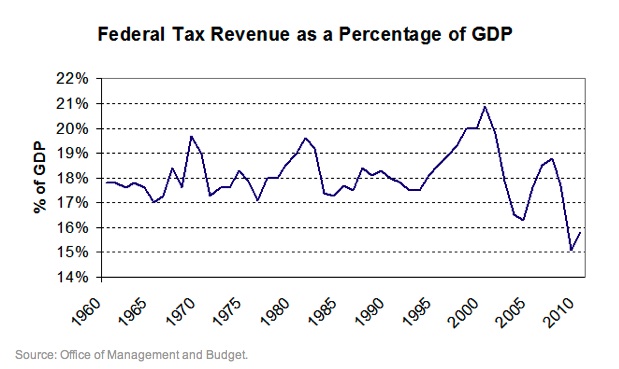The tax revenue has fluctuated by several percentage points over the years, which translates to hundreds of billions of dollars.
actually tax revenue has stayed within an amazingly tight set of parameters; not really straying (with our current notable exception) more than 2 points away from the mean. look at your own chart man; a drop in tax
rates from 91 to 35 percent saw a drop in tax
revenue of only 2% of GDP. and then the revenue went back up. claiming static tax estimates have
any measure of accuracy is
ludicrous.
Our tax revenue has been as low as 15% of GDP (last year) or as high as 21% of GDP
exactly. the largest recession since the great depression combined with the largest deficit spending in history was
still only able to shift that thing
3.5 percentage points off the mean
The difference between the two, in dollar amounts, is huge. Why do you think it can't move more than 1/18%?
and it's even bigger when you write it out long-ways. look:
$100,000,000,000 (puts pinkie in mouth)
but the fact is, that when we're talking about actual attempts to effect future tax revenues, we need to recognize that those returns will be a function of GDP
far more than they will be a function of tax
rates. if our goal is to
increase revenue, therefore, we must increase
GDP
yes. this is the exact same chart i provided earlier, except that you cut out the comparison to tax rates and zoom in to make the fluctuation
look bigger.
here:
this actually compares the two topics we are discussing, as opposed to showing one all zoomed up and scary-like. now, you look at that chart and
you tell me if the fluctuations in the top tax rates match - in a
one to one statically scored manner fluctuations in the tax revenues.
well, fluctuations in the tax rate do - in fact - effect fluctuations in the tax revenue. how?
Government expenditures have increased every year since 1965 yet, going back to the chart again, tax revenues have stayed in the 15-21% band. So what makes you think that reducing expenditures will generate revenue? Even from a theoretical perspective...why would it?
you are moving money from less efficient allocations to more effecient allocations. once you are willing to accept the assumption that communism does not work as well as the free market when it comes to the efficient allocation of resources, it becomes virtually tautological.
There is no evidence that lower tax rates will generate revenue, and plenty of evidence to the contrary.
actually it virtually always does; it just depends on what your time horizon is.


